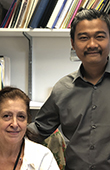Part I: Meet Marina
In 1990, St. Petersburg engineer Marina Merlin and her scientist husband were desperate to move their family to America from the Soviet Union. Rampant anti-Semitism had made their lives intolerable. “Street-level anti-Semitism: my son was beaten in school, in first grade,” remembers Marina. “And at work, you sometimes couldn’t get a position if you were Jewish.” Granted refugee status by the United States, the family applied for exit visas — a request denied by the Russian government. Marina and her family despaired. They had become refusniks.
But an organization stepped in that would change the course of their lives, and create an unexpected ripple effect that would extend far beyond Marina and her family. The Hebrew Immigrant Aid Society of Pennsylvania, better known as HIAS (“HY-yis”) PA, took care of the family’s legal paperwork and, since the family had no relatives in the States, managed to secure a “community sponsor” in the form of Society Hill Synagogue. Jewish Federation-supported HIAS PA was well-skilled in finding creative solutions to refugee crises: Founded in 1882 to help low-income and at-risk immigrants and refugees, it had provided support for Jews emerging from the pogroms of Eastern Europe, from the horrors of the Holocaust and now, from the collapse of the Iron Curtain. In 1992, Marina Merlin successfully came to Philadelphia with her parents and two children; 13 months later, her husband was able to follow.
Marina’s American life began as a shock, but as she slowly adapted, she realized her experience could be of use to others. “I could share that knowledge with other refugees and immigrants. I wanted to give back.” So she returned to work at HIAS PA.
That’s how she met Gin.
Part II: Meet Gin
Gin Sum was born in Burma (now Myanmar) in 1989, and grew up under a military regime that suppressed democracy and oppressed minorities and religious groups. When Gin was three years old his father, a Christian pastor, had to flee the country for his safety. “I didn’t see him again for 17 years,” remembers Gin. His mother did what she could to protect Gin and his four siblings from harassment by the authorities, but finally, in 2006, she told her children it was time to run. The family crossed the border into nearby India and made it to a New Delhi refugee camp, where they would remain for the next three years.
In far-away Philadelphia, wheels were set in motion. With fewer numbers of Jewish refugees needing help these days, HIAS PA’s clientele had expanded and they had already helped Gin’s father get asylum in the U.S. Now working to reunite the family, they were under severe time constraints because Gin’s father had developed terminal brain cancer. HIAS PA helped to expedite the family’s arrival; they landed at Philadelphia airport in December 2009, when Gin was 20 years old. “With God’s grace we were able to spend a little over a year with him,” says Gin of his father.
PART III: Life in Philadelphia
Life in Philadelphia was an adjustment for Gin. In Burma he had been a student, but now he worked as a busboy. Getting around in an unfamiliar setting and in an unfamiliar language was frightening. He was grateful for the resettlement support from HIAS PA, who picked the family up at the airport, found them a house and connected them with the Burmese community; caseworkers also helped them take care of necessities like applying for social security cards and scheduling medical appointments. Gin listened carefully to his caseworker as she instructed him on finer points of transportation, hygiene, money management. That caseworker was Marina.
“Gin is like a son to me,” Marina kvells. “I’m very proud of Gin. He has grown, not because of me, but because of him — he always had that in him.”
“I come from this culture of giving back: Once someone does something for you, you give back,” Gin says. “So I started volunteering as a translator.” Now, both Marina and Gin work full-time for HIAS PA: He as the Employment Coordinator, helping new arrivals with job placement; she, as a Department of Justice-accredited representative who advocates for HIAS PA clients in immigration proceedings.
For Gin and Marina, the fact that others were there to respond to their needs means now they, too, are in position to respond to the needs of others. “It’s like a chain of knowledge,” says Gin. “And helping them adapt until they feel they are home.” We should all aspire to be as responsive as Marina and Gin.
When you are responsive, you are sensitive enough to anticipate others’ needs, prepared enough to react calmly, and nimble enough to act quickly, because there is no time to wait.
For more about HIAS Pennsylvania, click here. For more about the positive attributes we share at the Jewish Federation, click here.



